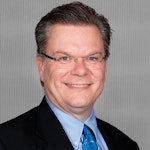Historically, Sterile Processing as a department and function tends to be given short shrift when it comes to organizational respect. At best, SPD is viewed transparently; at worst, SPD is blamed when something goes awry.
“Many people don’t understand how technical our jobs are and how many different things we are responsible for managing – people, water quality, workflow, quality, cost savings, regulations/standards, supplies, etc. This goes back to the importance of telling our story, leading and developing teams, and building trust,” noted Courtney Mace Davis, Director, Sterile Processing, NorthShore University HealthSystem.
But Mace Davis acknowledges that trust takes time to build, so the SPD team achieved it by leading collaborative teams toward improved workflow, compliance, and cost-savings. She shares three examples – one representing each improvement.
“Workflow was improved at [NorthShore’s] Skokie hospital as part of the renovation project. While the new space was needed to support volumes, it also required a need to improve our workflows. For instance, case carts that previously were delivered to decontamination right next to the sink now needed an indicator to signal that case carts were ready to be unloaded. This was due to the new distance between the elevator and the sinks. We now have blind spots to account for and a need to prioritize the workflow. We had an elevator light installed in the ceiling to indicate a case cart’s arrival and a receiving person in decontamination prioritizes the work by pushing case carts to the appropriate sinks.
“Compliance was enhanced as we improved our robotic reprocessing through the purchase of STERIS washer racks with flushing adapters, lighted magnifying glasses, timers and soaking buckets with racks. The result was fewer quality events reported by the OR.
“We hired an instrument coordinator at one of our hospitals who is working with other hospitals in the system to identify extra instruments and check with each other before purchasing new. This system-based approach to instrument management is new to us in the past six months but has already saved our department more than $100,000 in new instrument costs.”
SPD’s essential nature to the operating room and to patient care needed to be promoted, according to Mace Davis.
“The critical role of the Sterile Processing department (SPD) to a high-functioning operating room (OR) is often underappreciated and misunderstood,” she observed. “They are often recognized when there was a system breakdown and left to their own work when things were ‘going fine.’ This cycle of transactional interaction and underinvestment needed to be broken first by elevating the SPD team to the table as a member of the OR management team on equal footing with any other stakeholder.”
And that’s precisely what NorthShore University HealthSystem did with its SPD team.
The road to respectability started with a new leader over the OR who saw with his own eyes just how SPD operated once the OR finished a case.
“As the Vice President of Perioperative Services, I would round with clinical leaders and also spend time asking direct care givers for an understanding of what is working and where we have opportunities to improve,” said Gus Granchalek, Vice President, Perioperative Services & Anesthesia. “In my early days in the role, I recall being in the sterile core between cases as the rooms turned over and watching as the nurses, techs and team leaders prepped for the next case. Invariably, they would wheel a case cart into a room, inventory their trays and supplies and realize they were missing something. The feeling of anxiousness that washes over that team, now scrambling to find their missing tray or supply, is incredibly powerful and served as a call to action for all of us. In the beginning, the motivation for this journey was to ensure that every case started in a coordinated fashion and the team could keep their focus 100% on the patient.”
NorthShore also added Matt Belanger as Director, Clinical Operations, who was new to SPD, but ready to learn fast. What they found motivated them to pursue transformational change and sustained improvements using their internal assets and resources rather than outsourcing to a third party.
“Hiring consultants was a consideration as we embarked on our improvement journey,” Granchalek noted. “From the vantage point of the VP, the key to transformation is leadership and sustainability, which we hired for with the Director of Sterile Processing. She and the Director of Clinical Operations were a formidable pair. Together, they had profound understanding of the organization’s culture, deep industry expertise and an ability to form and lead teams that would build a culture of excellence. Simply, they believed in what was possible and that was infectious. Building this culture has been the foundation for success throughout our journey. Organizational leadership felt it important to empower and challenge the director and managers to lead these important efforts and create sustainable change.”
With a seat at the multidisciplinary table, SPD often leads discussions and outcomes; hosts daily huddles and routine management review meetings, monthly multi-disciplinary “Connections” meetings and quarterly quality and productivity meetings; and cross-trains staff so that they can fill in when and where needed but also specialize in selected areas.
SPD helps managers learn and then lead projects with such methodologies as 6S, Plan-Do-Study-Act (PDSA) and Define-Monitor-Analyze-Improve-Control (DMAIC), according to Mace Davis. One of the managers, working with OR peers, created a poster about the power of teamwork that was displayed at a national OR conference.
“Incorporating problem solving tools puts some structure to our ideas and solutions and reminds us of the importance of monitoring to sustain,” she said. “Putting things in poster form is a great way to build pride and communicate wins. It also gives our team a chance to showcase their work both internally and externally.”
Still, SPD saw a number of staff members leave for various reasons, including personal and pandemic-related challenges around mid-year last year, Mace Davis notes. SPD turned to recruiting new graduates from local college sterile processing programs that allowed them hands-on training. Thankfully, SPD were able to obtain funding to invest in temporary educators to fill more than 60% of those open staff lines with dedicated preceptors who don’t take away from the full-time staff supporting daily operations. In fact, at one point, 25% of staff was new and in orientation, she adds.
“Once we had the SIPS Educators in place, we were able to better partner with local SPD programs and brought new grads in at a rate of 10 new hires a month,” she said. “This was very exciting, but also impacted our daily operations. In order to maximize our training resources, we put all new hires in one location. While this was the best way to train so many people at one time, it was also challenging to support in terms of available locker space, workstations/computers, and break room space – especially when capacity was diminished due to pandemic-related social distancing requirements.”
With 85% of SPD staff certified, Mace Davis is making a concerted effort to increase that number as well as promote re-certification through monthly focused continuing education opportunities during work time. SPD also developed career opportunities within the department across the entire system through budget restructuring to fortify SPD’s enduring bench strength, she adds.
Mace Davis credits the diversity of SPD’s management team’s experience as contributing to departmental success.
“SPD is a rapidly changing field and none of us has all the answers,” she indicated. “However, having hired from diverse backgrounds there is likely someone on our team who has the answer we are looking for. Finally, we have developed a culture in which, in the absence of an answer, we can openly discuss, disagree and find consensus.”
NorthShore sets new direction, trajectory for opportunities, success
SPD should be a quality hub within healthcare organization
NorthShore SPD weathers pandemic pressure

Rick Dana Barlow | Senior Editor
Rick Dana Barlow is Senior Editor for Healthcare Purchasing News, an Endeavor Business Media publication. He can be reached at [email protected].





